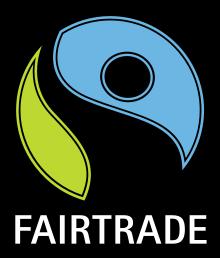Fair trade certification
(Redirected from Fairtrade)
Fair Trade Certification is a product certification that allows people to identify products that meet agreed environmental, labor, and developmental standards. Overseen by several organizations, such as Fairtrade International (FLO) and its member organizations like Fairtrade America, the certification aims to empower farmers and workers in developing countries by providing them with more equitable trade conditions, thereby contributing to sustainable development.
Overview[edit | edit source]
Fair Trade Certification is applied to a variety of products, including but not limited to coffee, tea, chocolate, sugar, bananas, and cotton. The certification signifies that the product has been produced in accordance with Fair Trade standards, which are designed to support sustainable farming practices, improve working conditions, and protect the environment.
History[edit | edit source]
The concept of Fair Trade has its roots in the post-World War II period, but it was not until the late 20th century that formal certification schemes began to emerge. The first Fair Trade label, Max Havelaar, was introduced in the Netherlands in 1988, named after a fictional Dutch character who opposed the exploitation of coffee pickers in Dutch colonies. This initiative laid the groundwork for the establishment of Fairtrade International and the expansion of Fair Trade Certification to various products and countries.
Standards and Certification Process[edit | edit source]
Fair Trade standards are designed to support the sustainable development of small-scale producers and agricultural workers in the poorest countries of the world. These standards include minimum price guarantees, which protect producers from volatile market prices, and an additional Fair Trade Premium, which is invested in social, environmental, or economic development projects chosen by the community.
The certification process involves rigorous checks and audits to ensure compliance with Fair Trade standards. Producers and traders must apply to a Fair Trade certification body and undergo an initial inspection. If they meet the standards, they are granted certification and subject to regular follow-up audits.
Impact[edit | edit source]
Fair Trade Certification has been credited with providing numerous benefits to producers in developing countries, including improved living conditions, better access to education and healthcare, and stronger, more sustainable communities. However, the effectiveness and efficiency of Fair Trade have been subjects of debate among economists and development experts.
Criticism[edit | edit source]
Critics argue that Fair Trade Certification can lead to market distortions, with the premium prices for Fair Trade products potentially leading to overproduction and a surplus of certified goods. Others question the extent to which the additional price paid by consumers is passed on to the producers.
See Also[edit | edit source]
Search WikiMD
Ad.Tired of being Overweight? Try W8MD's physician weight loss program.
Semaglutide (Ozempic / Wegovy and Tirzepatide (Mounjaro / Zepbound) available.
Advertise on WikiMD
|
WikiMD's Wellness Encyclopedia |
| Let Food Be Thy Medicine Medicine Thy Food - Hippocrates |
Translate this page: - East Asian
中文,
日本,
한국어,
South Asian
हिन्दी,
தமிழ்,
తెలుగు,
Urdu,
ಕನ್ನಡ,
Southeast Asian
Indonesian,
Vietnamese,
Thai,
မြန်မာဘာသာ,
বাংলা
European
español,
Deutsch,
français,
Greek,
português do Brasil,
polski,
română,
русский,
Nederlands,
norsk,
svenska,
suomi,
Italian
Middle Eastern & African
عربى,
Turkish,
Persian,
Hebrew,
Afrikaans,
isiZulu,
Kiswahili,
Other
Bulgarian,
Hungarian,
Czech,
Swedish,
മലയാളം,
मराठी,
ਪੰਜਾਬੀ,
ગુજરાતી,
Portuguese,
Ukrainian
Medical Disclaimer: WikiMD is not a substitute for professional medical advice. The information on WikiMD is provided as an information resource only, may be incorrect, outdated or misleading, and is not to be used or relied on for any diagnostic or treatment purposes. Please consult your health care provider before making any healthcare decisions or for guidance about a specific medical condition. WikiMD expressly disclaims responsibility, and shall have no liability, for any damages, loss, injury, or liability whatsoever suffered as a result of your reliance on the information contained in this site. By visiting this site you agree to the foregoing terms and conditions, which may from time to time be changed or supplemented by WikiMD. If you do not agree to the foregoing terms and conditions, you should not enter or use this site. See full disclaimer.
Credits:Most images are courtesy of Wikimedia commons, and templates, categories Wikipedia, licensed under CC BY SA or similar.
Contributors: Prab R. Tumpati, MD


